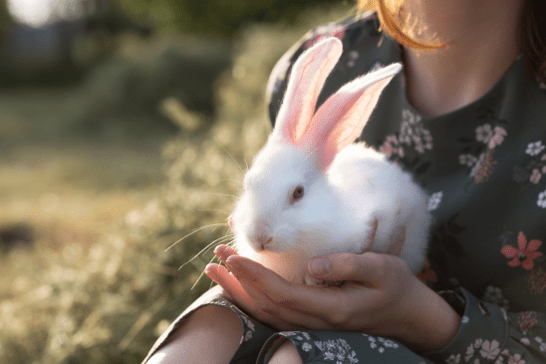‘Owning a rabbit can be a rewarding experience, but it also requires considerable responsibility. Before bringing a rabbit into your home, it is essential to educate yourself on the proper care and needs of these beloved pets. From setting up a suitable living environment to providing a balanced diet and regular veterinary care, there are many factors to consider.’
How to take care of Rabbits
Housing a Rabbit
Rabbits require continuous access to ample space. We strongly advise against keeping just one rabbit, as two rabbits necessitate a minimum area with dimensions of 3x2x1 meters. Additionally, they will require a sheltered area for protection, such as a hutch, with dimensions of at least six feet long, two feet wide, and two feet tall.
In terms of materials, it is best to use wire mesh or wooden panels for the walls and roof of the enclosure. A solid floor, such as plywood or linoleum, is recommended to ensure your rabbit’s comfort and prevent foot injury. Adding a layer of soft bedding, such as straw or fleece, on top of the floor will provide additional comfort and insulation.
What to Feed a Rabbit?
For your rabbits to maintain a healthy diet, it is crucial that fresh and clean drinking water, along with high-quality hay and grass, constitute the majority of their food. Bunnies are herbivores pets. Hay or grass plays a significant role in ensuring the proper functioning of a rabbit’s digestive system, making its availability essential. Additionally, you can enhance their diet by incorporating leafy greens and a small portion of pellets. Avoid feeding your bunny high-sugar treats.
Grooming & Exercise
It is recommended to groom rabbits with short coats every week, particularly during moulting. Regular grooming helps maintain their coat’s health and prevents matting. You should also provide bunnies with ample opportunities for exercise.
Do Bunnies Need Vaccinations?
Your bunny typically does not require shots. However, in some instances where rabbits reside in regions endemic to severe and potentially life-threatening conditions such as viral hemorrhagic disease or myxomatosis virus infection, some veterinarians may advise vaccination as a preventive measure against these illnesses. Regular veterinary check-ups are also necessary to monitor their overall health and prevent potential diseases.
Companionship for Rabbits
Rabbits are known to be social creatures. It is recommended that rabbits live in pairs or groups. Littermates often form the strongest bonds and make excellent companions for one another. However, it is essential to note that neutering is a necessary step in ensuring a harmonious living arrangement between rabbits.
Rabbit Behavior
Rabbits are also known for their unique habits and activities, such as digging, chewing, and hopping. Rabbits exhibit various behaviors such as nudging, pushing, or tossing objects as a means of play or seeking attention from their humans. These actions can also indicate territorial behaviour, signalling possessiveness and the desire to establish boundaries. Rabbits are inclined towards orderliness and may experience distress when their belongings are rearranged.
Handling Rabbits
When handling a rabbit, it is essential to lift them properly to ensure their safety. Using one hand to support the thorax and the other to support the hindquarters, gently lift the rabbit from underneath. Make sure the hind feet are either flat in your hand’s palm or securely held between your fingers. Be cautious not to allow the rabbit to twist, jump, or flip, as these movements can potentially result in severe spinal injuries.
Conclusion
We have provided valuable information on the essential aspects of rabbit ownership, including housing, diet, exercise, and healthcare. Providing a loving and safe environment can ensure a happy and healthy life for your new bunny friend.



